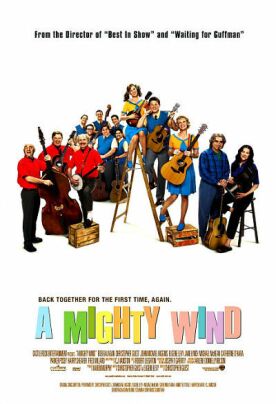Mighty Wind, A
(Reviewed April 17, 2003)
|
| Rating: |

|
|
|
Order this DVD or VHS Tape through Amazon.com
|
Like his last picture, Best in Show (2000), Christopher Guest’s latest, A Mighty Wind, is hilariously funny even though it leaves us with a sense that its satirical target is not quite worthy of the awesome array of comic weaponry he has deployed against it. In Best in Show, the target was obsessive dog-fanciers who live to show off their pets at competitive dog shows. In A Mighty Wind it is the "folk" singers who for a brief period in the early 1960s found themselves commercially successful. Neither is exactly what you’d call a live subject, from a satirical point of view, though the folkies at times suggest a return to the form of This Is Spinal Tap (1984) — directed by Rob Reiner but written by Mr Guest and Michael McKean — which so brilliantly deflated the artistic pretensions of a heavy metal rock group made up of virtual cretins.
But nowadays there is no point in trying to satirize self-important pop stars. Like so many potential targets, they have evaded the parodist’s dart by becoming parodies of themselves. You only have to listen to the Dixie Chicks opine about the war in Iraq to see that the capacity of popular musicians to leave satire halting behind them has increased exponentially in the last 20 years — rather like the technical superiority of the U.S. armed forces over their Third World opponents. It is now quite normal to wake up and read in one’s morning paper that Madonna thinks "my real responsibility is to bring light to the world and make the world a better place." No one thinks anything of it. It has become too familiar even to be funny.
If the folk music stars of the 1960s make better subjects it is only because they are long forgotten by a fickle public and so have had few opportunities to make themselves as ridiculous as other popular music stars. Mr Guest seeks to remedy this deficiency by imagining a reunion concert, memorializing a recently deceased record producer called Irving Steinbloom and organized by the latter’s son, Jonathan (Bob Balaban), that will bring together on one stage at Town Hall in New York three allegedly "legendary" folk groups.
These include the relentlessly upbeat New Main Street Singers (among them Jane Lynch, John Michael Higgins and Parker Posey), of whom Irving Steinbloom used to say, "They were the kind of infectious it was good to spread around." In their brightly-colored matching outfits, they join the Folksmen (Mr Guest, Mr McKean and Harry Shearer), and the soulful Mitch and Mickey (Eugene Levy and Catherine O’Hara), the erstwhile King and Queen of folk who had a highly-publicized bust-up 30 years ago.
The genius of the film is that musically all three groups are played straight. The actors themselves perform the music, which is perfect pastiche of the likes of the Kingston Trio or the New Christy Minstrels. Only the occasional double entendre in the lyrics — the final hootenany has the tout ensemble grinning and singing:" There’s a mighty wind that’s blowin’. . .It’s blowin peace and freedom, It’s blowin’ you and me" — and a slight exaggeration of their originals’ mawkishness or lame attempts at humor or working class authenticity tips us off to the parody.
Most of the film consists of a Spinal Tap-like documentary of the putting together of the Town Hall show. This is also played straight, for the most part, though the introduction of Fred Willard, as screamingly funny here as he was in Best in Show, as the washed-up comedian Mike LaFontaine is somewhat gratuitous. Details of the singers’ long and anti-climactic post-1960s careers — Mickey is now married to Leonard Crabbe (Jim Piddock), a model train enthusiast and executive in the bladder management industry while Mitch has spent most of the intervening years in a mental institution — are interspersed with pretentious commentary from folk music historians. For instance, Mitch and Mickey’s greatest hit, "The Kiss at the End of the Rainbow," was famous in its day for including an actual kiss at its climactic moment. This one of the academic folk music specialists calls "a great moment in the history of music, maybe a great moment in the history of humans."
But such examples can only begin to hint at the film’s comedic riches, many of which consist only of sight-gags — such as the facial expressions during the concert of the Steinbloom son who has to be dragged back to New York for it from North Dakota where, in a lovely ironic touch, he has moved to get as far away from folk music as possible — or the names of folk heroes, like Ramblin’ Sandy Pitnick. It may seem that the folkies are an easy target, but that didn’t stop me from laughing myself silly 
[Top][Back]
|



